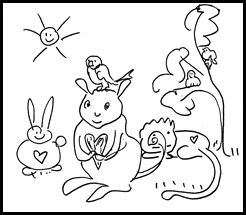

Epstein Family Photos
I was reminded of the topic of utilizing nonsense words when reading Tyson Seburnt’s excellent post Comprehension is often not what it appears . In his post he uses nonsense words to show students that copying from a text doesn’t mean you comprehend the text. He even offers a ready made exercise for us to use!
I had never thought of that.
I’ve been using nonsense words for years (think late 1980’s) but only when working with teachers, not students. The topic is always “teaching students who have a poor vocabulary”. It is difficult to tell teachers “Pretend you don’t know some words in this reading passage”. With nonsense words they really don’t know the words!
My first source was also the first book on education I ever owned: “Teaching Reading to Deaf Children” by Beatrice Ostern Hart from 1963! The author used nonsense words to indicate words a deaf child wouldn’t know. I began by using her example to highlight something else.
Here is the title and the first paragraph of Hart’s text:
John and His Drum
John had a drum.
It was a flid big drum.
It made a big shole when he krinned it.
John liked the drum.
You can tell that “flid” is an adjective, “shole” is a noun and “krinned” is a verb. You know that because you know basic syntax. I claim that weak pupils who have trouble remembering vocabulary, ESPECIALLY these pupils, need to work on syntax as a tool for building reading comprehension skills and dictionary skills. If they know that “flid” is an adjective they don’t necessarily have to know any more than that. And if they decide to look up the noun “shole” in the dictionary, the fact that they know it is a noun in advance will enable them to choose the right definition of the word (so many words in English have different meanings as verbs or nouns). When you know that “krinned” is a verb it is actually pretty easy to guess what it means here (or, like before, that information will allow you to be a competent dictionary user). Students with learning disabilities (and with hearing problems) are allowed to use an electronic dictionary – that doesn’t help them as much if they don’t have any idea of the type of word they are looking up.
My second exposure to the use of nonsense words speaks for itself. Richard Lavoie is a powerful speaker and he also uses nonsense words for training. Except this time he’s trying to train all the adults who come in contact with the learning disabled child. Here is the relevant part of the film “FAT City – How Hard Can it Be”, which I found on YouTube:
I really recommend getting a hold of the whole film. All of his films are extremely powerful stuff, by the way.
I’ve tried to imitate Lavoie with the nonsense text to hammer in my point that remembering vocabulary items (or not remembering them) is not the only measure of reading comprehension. Reading is about more than strings of words!
Overall the nonsense words have worked well. However, each time this was the topic of a teachers training session, there was always one teacher who would ask why on earth I wanted to spend time teaching nonsense words to students…. I guess there is always room for improving my talks!




